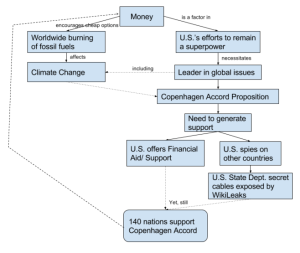When determining what was the most prevalent theme when it came to issues surrounding the climate change and Copenhagen Accord issue, I found that money drove so many issues. Once I put the idea of money at the peak of the diagram, I demonstrated how the problem of burning fossil fuels is stemmed from money, as fossil fuels is typically the least expensive option than exploring renewable sources. Money is additionally a large factor in why the United States is, and strives to remain, a global superpower. This is not necessarily a bad thing- it is hard to deny that the United States strives to have a strong, healthy economy for its citizens. On the other hand, however, it may take away from developing countries’ resources and opportunities. Still, the U.S. asserts itself as a leader in issues that affect everyone globally, such as climate change. The Copenhagen Accord was developed, and it posed a challenge to generate support for the ideas in order to make strides in mitigating humans’ negative impact on the environment for a healthier world. Understanding the degree of influence the United States has over the global community, it offered astronomical amounts of financial aid to countries such as Maldives, put pressure on countries like Ethiopia, and made many attempts to spy on and send secret cables to other countries. When these efforts were revealed in a WikiLeaks forum, it turned some heads. Still, the Copenhagen Accord was able to generate support from three quarters of those countries that were parties to the UN climate change convention.
I brought my diagram to full circle with the connection back to the recurring theme of money. The concept of money is a very interesting and dynamic topic. On one hand, it creates a dependency on the donor nation like the United States, for example. When you have a dependency on a nation, you can become subject to issues on their agenda. When a dependency cycle comes into play, global politics and power can often become the forefront subject that drives decisions by superpowers. On the other hand, financing developing countries is positive in that it allows for opportunities for those nations to develop themselves. This also ties into underdeveloped countries receiving compensation for being affected by climate change when they did not have the capabilities to heavily affect the change. For instance, a poorer country with limited access to fossil fuels will likely not create even a fraction of a carbon footprint that an industrialized nation does. I believe the U.S. State Department cables should not have been released because it did not result in any productive results other than select distrust in the government. While I do not think the method was a completely good one or a noble one, the ends truly do justify the ends. I believe in the global community, a strong and unwavering approach to getting others on board will help the collective problem of making Earth more sustainable. Sometimes harsh steps, like appealing to developing countries through finances, or spying on other countries are necessary, though they may not be appealing from a larger crowd. The most important thing to me is getting results. In a world divided by so many individual action issues, we must continue to explore steps that will augment collective actions.


Hello, my name is Ranee and I like your system diagram. It was very smart to link everything with money being one of the parts. While working on this assignment and reading the article I understood money was a significant factor to the cables but was disappointed by how small a part of the communications was environmental in focus. Check out my post at:
http://sites.psu.edu/geog30/2016/04/15/connections-mod-9-perricone/